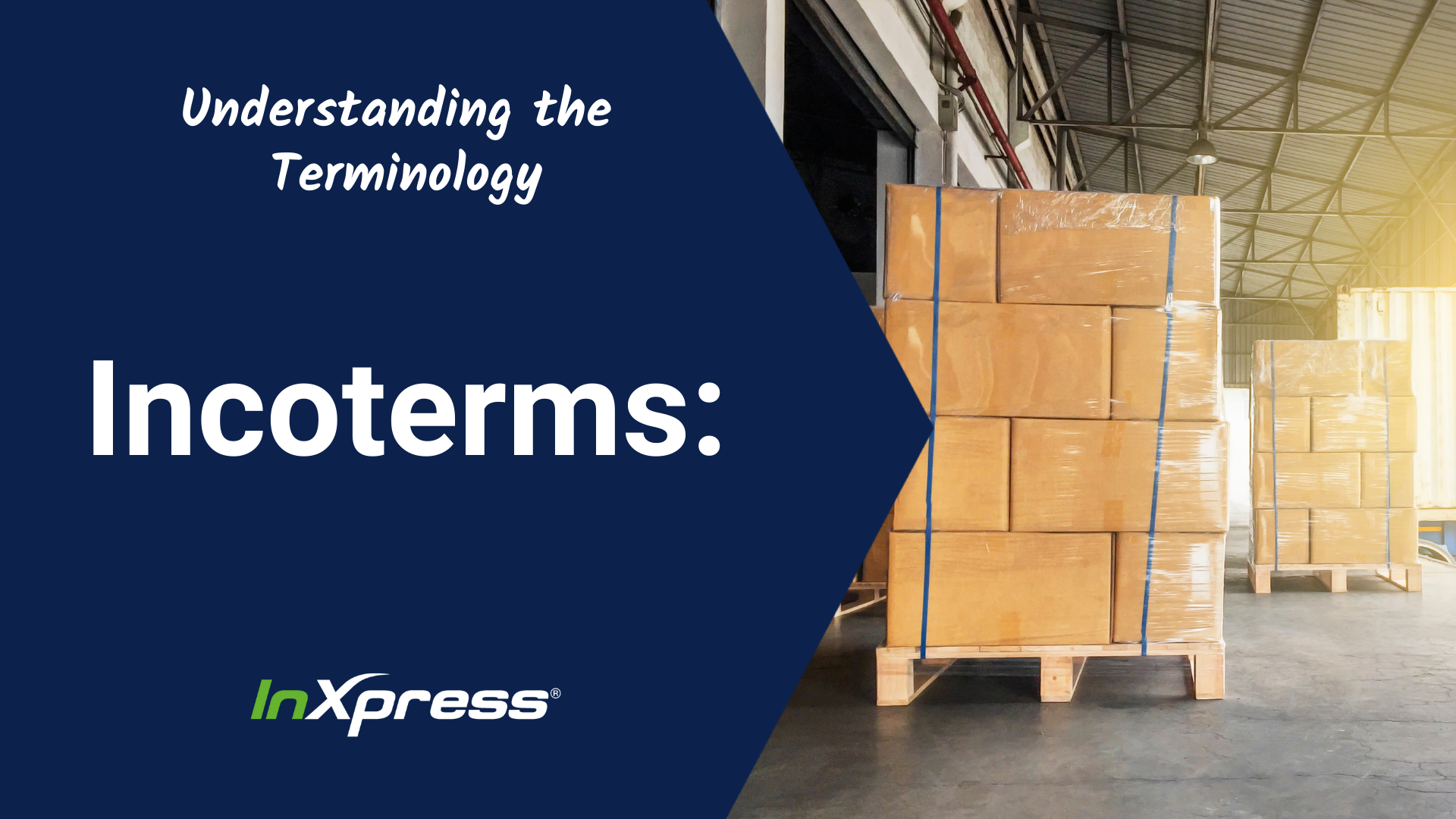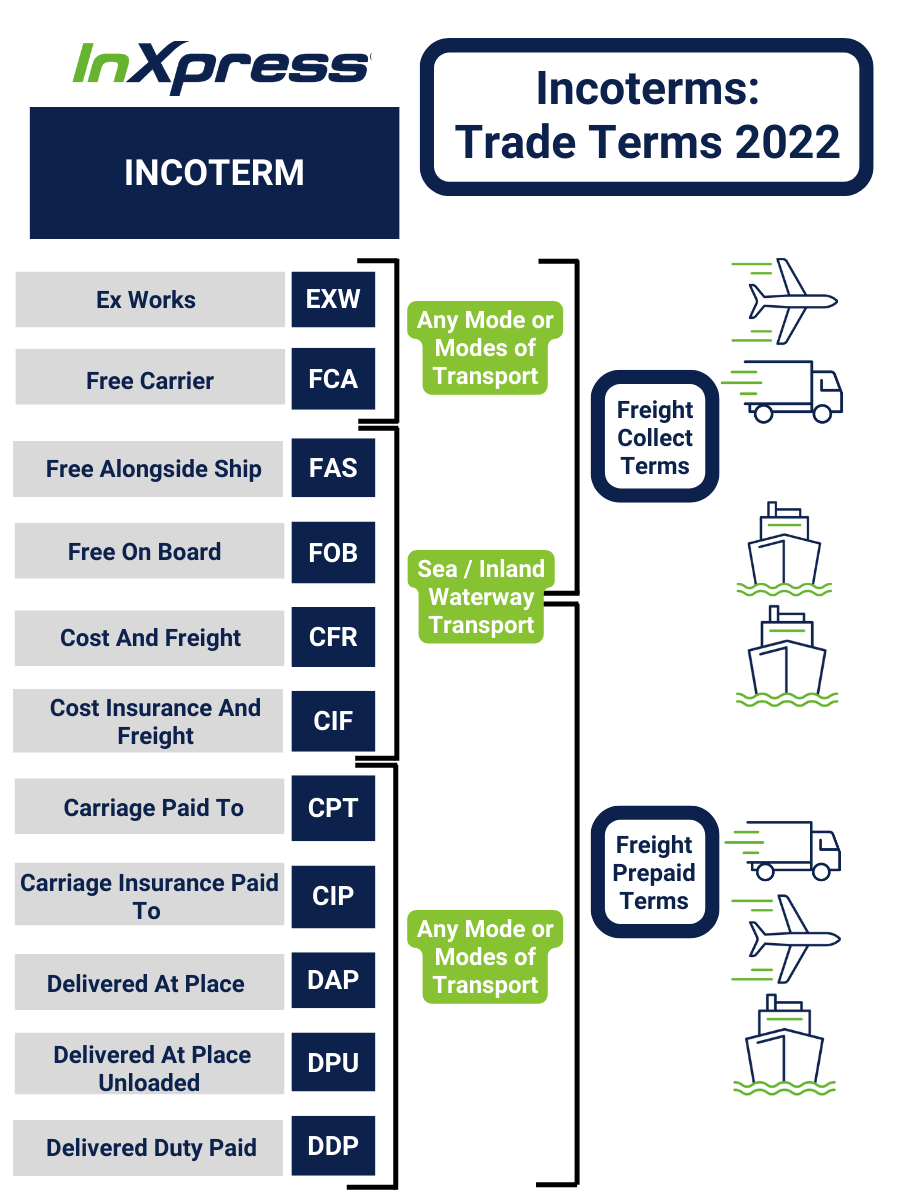INCOTERMS: Helping you to understand the complex terminology

In logistics, one of the most common sets of jargon are Incoterms.
The idea of these terms can seem confusing at first, but If you are shipping goods, knowing your incoterms is essential to understanding who is responsible for what in the supply chain.
InXpress Sandton have created the below short-guide to Incoterms in order for you to gain a better understanding of them and be more prepared for your shipping process.
What Are Incoterms?
Incoterms (or “International Commercial Terms”) are a set of rules developed by the
International Chamber of Commerce (ICC). Created as an industry standard to facilitate international trade and to interpret the trade terms that all parties to a contract of sale agree upon.
An Incoterm defines a transaction between two parties (generally, the party exporting goods and the party importing them). These terms are used to aid communication and reduce any confusion when dealing with international trade.
Revised and updated approximately every ten years, Incoterms provide guidance to importers, exporters, lawyers, transporters, insurers, and any other parties involved in the international trade process.
What Are Incoterms Used For?
Used in contracts in a 3-letter format - followed by the place specified in the contract (generally the port or where goods are to be picked up). Incoterms are used to protect suppliers, carriers, and buyers while ensuring the timely payment of goods, services, and duties.
- Incoterms make clear when risks pass from seller to buyer under each of these rules.
- They outline the obligations of both the buyer and the seller in a trade transaction.
- These terms also define how costs are allocated between the buyer and the seller.
Point of delivery: Define the point of change of hands from seller to buyer.
Transportation costs: Define who pays for the transportation required.
Export and import formalities:
Define which party must arrange for the import and export formalities.
Insurance cost: Define who is responsible for the insurance costs.
Incoterms 2020 Definitions

The current revision of the terms, Incoterms 2020, went into effect Jan. 1, 2020, and consists of the below 11 Incoterms:
| INCOTERM | INCOTERM MEANING |
|---|---|
| EXW – Ex Works | This defines that the selling party agrees to hand over ownership of the goods at a specific location. Here, the seller does not need to load the goods on any collecting vehicle or clear the goods for export. |
| FCA - Free Carrier | This term designates that the selling party must make the goods being sold available at either his own premises or at another location. The seller is responsible for clearing the goods for export and must pay any associated fees. The buyer must instruct the carrier to provide a Bill of Lading when the goods are loaded. |
| CPT – Carriage Paid To | The same responsibilities and terms apply with this term as with the above FCA, however, in this case the seller must also pay all delivery costs to a certain location. |
| CIP – Carriage Insurance Paid To | The seller has the same responsibilities as with the above CPT but must pay insurance costs (and the insurance must have a high coverage ratio). The parties can however, come to an agreement to apply more limited coverage. |
| DAP – Delivered At Place | The seller delivers the goods to an address or location agreed upon between both parties. The seller covers all costs and risk of loss during the delivery process. The responsibilities then pass on to the buyer once delivery has been made to the agreed location. |
| DPU – Delivered at Place Unloaded | Defines that the seller must cover all costs and risks associated with bringing the goods to an agreed location. There they can be unloaded and moved to other (or similar) modes of transportation. The seller must organize customs and unloading, while the buyer is responsible for customs clearance and any associated rights. |
| DDP – Delivered Duty Paid | The seller must cover all costs and risks of transportation, carry out all export and import processes, and pay any required import duties. These responsibilities only end when the goods arrive at the destination address and are ready to be unloaded. |
| FAS – Free Alongside Ship: | The seller takes sole responsibility for everything until the goods are delivered next to the ship’s loading point. At that point, all costs and risks transfer to the buyer who also has to arrange the export and import clearances. |
| FOB – Free On Board: | All costs and risks lie with the seller until the goods are on board the ship. The seller is also responsible for all export clearance processes. Once on board the ship, the responsibility of the goods then shifts to the buyer. |
| CFR – Cost And Freight: | The same conditions apply as with the above FOB however, the seller must also pay for the transportation of the goods to the port of their shipment. |
| CIF – Cost, Insurance, and Freight: | The seller has the same obligations as with the above CFR, except for the fact that here, they must also pay for minimum insurance. (If the buyer wants further comprehensive insurance on the goods, then they must pay for it themselves) |











